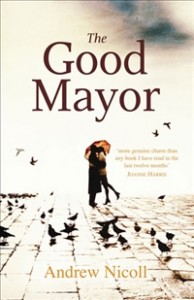Here are two passages from the journal Kill Your Darlings about writing. The first by Laurie Steed bemoans the conservative nature of Australian fiction writing, and the second taken from an interview with the Scottish author Andrew Nicoll (The Good Mayor) by S A Jones has a dig at meandering no-story, literary fiction.
The thing I’d say about Laurie Steed’s argument is that there are outlets for experimental fiction and there is plenty of literary fiction written in an urban setting. In fact most of the grants available go to this type of writing, and so they should. Where are the “traditional, restrictive modes of storytelling” that are so exclusive? For twenty or thirty years the literature board etc has ruthlessly rooted this out. Only recently has it made a feeble comeback.
While Nicoll’s critique of literary fiction is harsh, and probably sexist, he does have a point that that much literary fiction is overworked, precious and dismissive of the story-telling imperative. Great, enduring literature melds the two. In Australia, with the exception of few of our top writers like Peter Carey and Kate Grenville, we haven’t worked out the formula for literary best sellers. Where are our Ian McEwans or Zadie Smiths?
 I was also fascinated by Nicoll’s suggestion that the success of crime fiction is a hunger for novels with story. I’ve often pondered what readers see in the procedurals or the blood and gore serial killer stuff, but it’s true there is an undoubted satisfaction in the unravelling of threads and the depiction of relationships, often fairly mundane ones, against a world of menace and danger brought back to order at the end. The huge popularity of historical fiction could also be attributed to the desire for story (on an epic scale).
I was also fascinated by Nicoll’s suggestion that the success of crime fiction is a hunger for novels with story. I’ve often pondered what readers see in the procedurals or the blood and gore serial killer stuff, but it’s true there is an undoubted satisfaction in the unravelling of threads and the depiction of relationships, often fairly mundane ones, against a world of menace and danger brought back to order at the end. The huge popularity of historical fiction could also be attributed to the desire for story (on an epic scale).
“Thematically, much of Australian literature has for too long been focused on what Jo Case described in Issue Six of Kill Your Darlings as ‘bush and beach’. It’s been locked in traditional, restrictive modes of storytelling both culturally exclusive and gender biased. These modes are of little relevance to a predominantly urban contemporary Australian society, shaped as it is by multiculturalism, globalisation and neoliberalism. More importantly, regionalist literature is driving away a potential readership, a readership that can readily find more relevant and compelling characters, settings and narratives in various other media.”
– Laurie Steed
“I am bemused by the obsession with writing everything in the present tense. I’m told that this is supposed to create immediacy but it just creates neuralgia. I mourn the death of story. Page after page after tedious page where nothing happens and nothing is supposed to happen, just a failed drunk and an angry lesbian sitting in a cellar watching mould form while they internally agonise about the meaning of life. Stop! I get enough of that at home, I don’t want to read a book about it. That’s why the only books that sell are detective slasha shockas; because people know they are going to get a story. Why can’t we have stories that actually have something to say about the human condition too? Homer managed it, Dickens managed it. But the critics go along with it. I don’t know whether it’s symbiosis or parasitism but it’s a self-serving daisy chain. They tell people what is good and worthy and people buy the books, but they don’t buy them twice.”
Andrew Nicoll interviewed by S A Jones


Just stumbled across this post (via the Writers’ Centre newsletter). Nicoll isn’t being harsh: story sells books, just as story sells films (well, story and lots of things blowing up). Clear protagonist that we empathise with, on a transforming journey, with a clear goal, stakes, forces of antagonism, ticking clock. As he says, Homer managed it – The Odyssey is surprisingly readable. And something more modern, such as Water for Elephants, also has the necessary elements: that’s why it was a bestseller, even though it lacks cops and gore.
And as far as Australian works go, only the story matters, not the setting. If people really cared about the setting and its relevance to their lives, they wouldn’t have read so many books about a lady detective in Botswana.